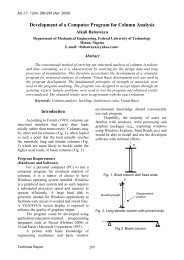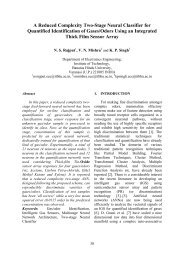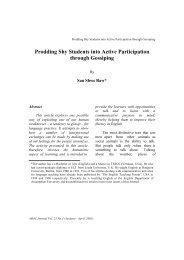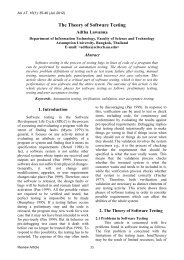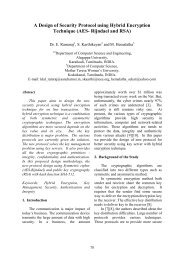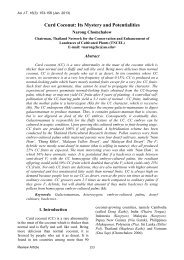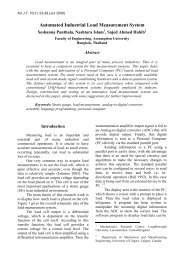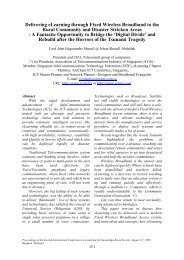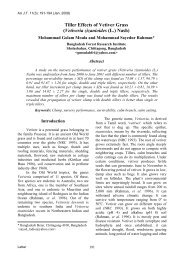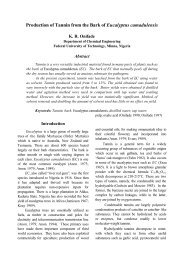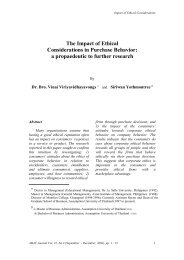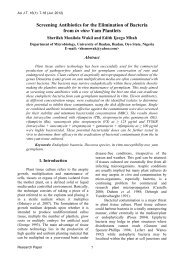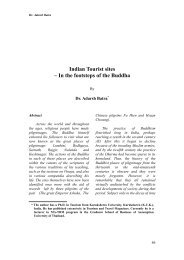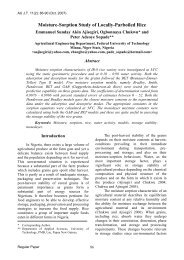PDF format - AU Journal - Assumption University of Thailand
PDF format - AU Journal - Assumption University of Thailand
PDF format - AU Journal - Assumption University of Thailand
You also want an ePaper? Increase the reach of your titles
YUMPU automatically turns print PDFs into web optimized ePapers that Google loves.
languages are taught and learned” and<br />
“the expected roles <strong>of</strong> the teacher and<br />
student” (Prescott, 1995, P. 97).<br />
Students’ respect for teachers differ<br />
considerably in Asian cultures when<br />
compared to that <strong>of</strong> the Western<br />
cultures. In many Asian cultures, notes<br />
Prescott, “teachers are accorded great<br />
respect. . . In Buddhist Burma, for<br />
example, the students pay obeisance to<br />
their teachers at an annual ceremony...”<br />
(P. 97). Similarly, “in <strong>Thailand</strong><br />
teachers are highly regarded” (Prescott,<br />
1995, P. 97) as, annually, a ceremony is<br />
held for students to respect to all<br />
teachers.<br />
Language Learning Is A Complex<br />
Process<br />
Language learning is a complex<br />
process involving many factors:<br />
psychological, cognitive, social, and<br />
linguistic. Unlike first language<br />
learners, foreign and second language<br />
learners usually do not have the luxury<br />
<strong>of</strong> time or <strong>of</strong> learning environments<br />
where they can use the second language<br />
in natural contexts. As a result, in<br />
designing a syllabus for these groups <strong>of</strong><br />
learners, it is essential for practitioners<br />
to note that, according to Kirkpatrick<br />
and Prescott (1995), “in East Asia,<br />
English is now commonly used as a<br />
lingua franca between Asians. For<br />
example, Thai and Japanese<br />
businessmen in Vietnam will use<br />
English with each other” (p. 104).<br />
Thus, “the cultural baggage <strong>of</strong> English<br />
becomes irrelevant as regional varieties<br />
<strong>of</strong> English develop. What becomes<br />
important is the culture <strong>of</strong> the people<br />
one is speaking to and not the culture <strong>of</strong><br />
the language one is speaking in”<br />
(Kirkpatrick & Prescott, 1995, p. 104).<br />
Foreign language learners, therefore,<br />
need “some knowledge <strong>of</strong> the culture <strong>of</strong><br />
the people they are dealing with and<br />
they need to be aware <strong>of</strong> their own<br />
cultural norms” (Kirkpatrick &<br />
Prescott, 1995, p. 104). They need<br />
English language teaching materials<br />
that contrast their own cultural norms<br />
with those <strong>of</strong> the people they<br />
communicate with. It is therefore,<br />
essential that syllabuses and teaching<br />
methodologies are designed so that<br />
“content and cultures should inform<br />
course content and practice, that local<br />
expertise should be integral to course<br />
development and delivery” (Kirkpatrick<br />
& Prescott, 1995, p. 104).<br />
It is essential that foreign or second<br />
language teachers be equipped to cope<br />
with the differences between foreign<br />
language teaching in their own cultural<br />
norms and those <strong>of</strong> the Western<br />
teaching practices and cultural norms.<br />
Further, they need to have knowledge<br />
and understanding that will allow them<br />
to maximise learners’ chances <strong>of</strong><br />
success. They will not be in a position<br />
to do this unless adequate pre-service<br />
and in-service educational provision is<br />
made available for them. If teachers <strong>of</strong><br />
language in Thai tertiary institutions<br />
continue not to be required to undergo<br />
specific training, they will continue to<br />
be unable to cope fully with the<br />
demands <strong>of</strong> the pr<strong>of</strong>ession.



